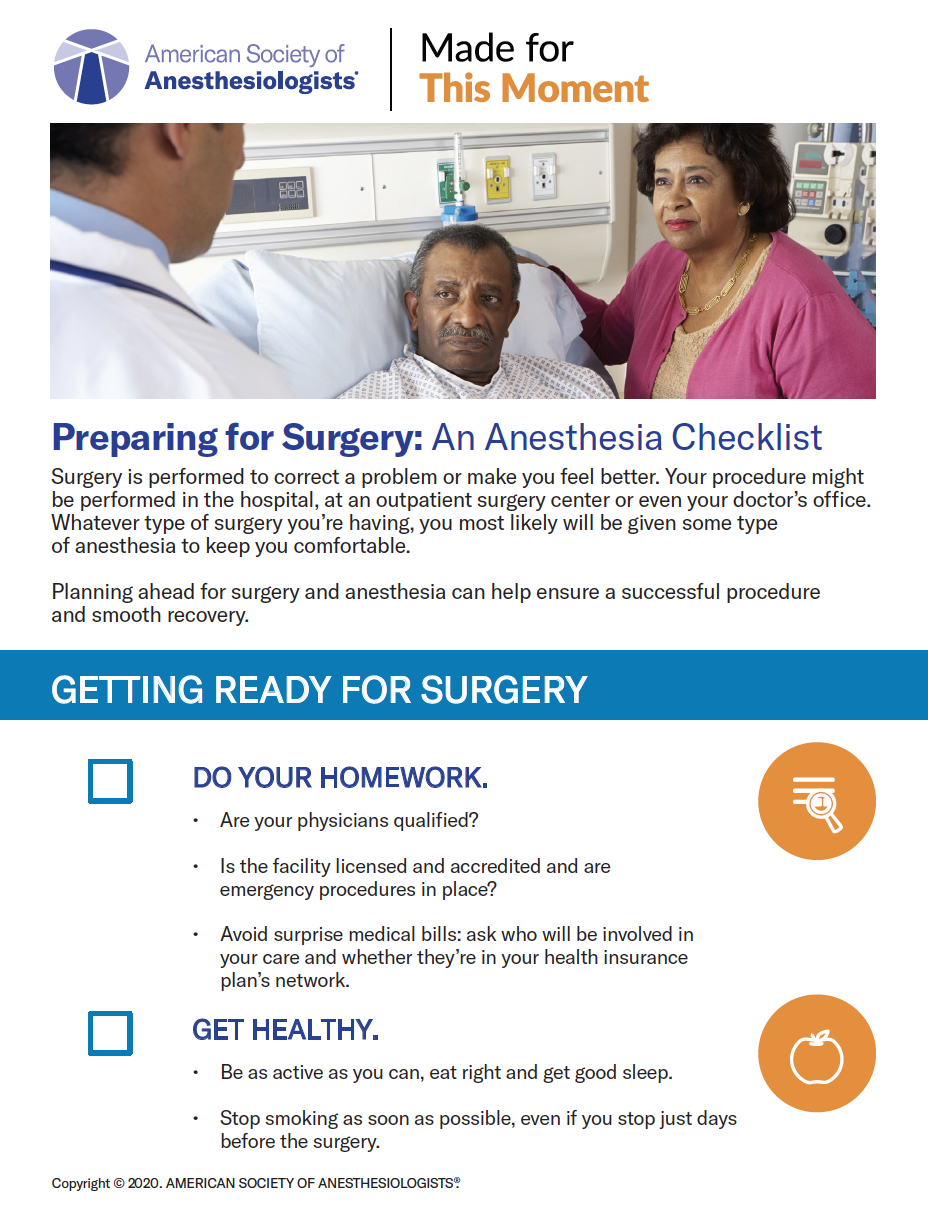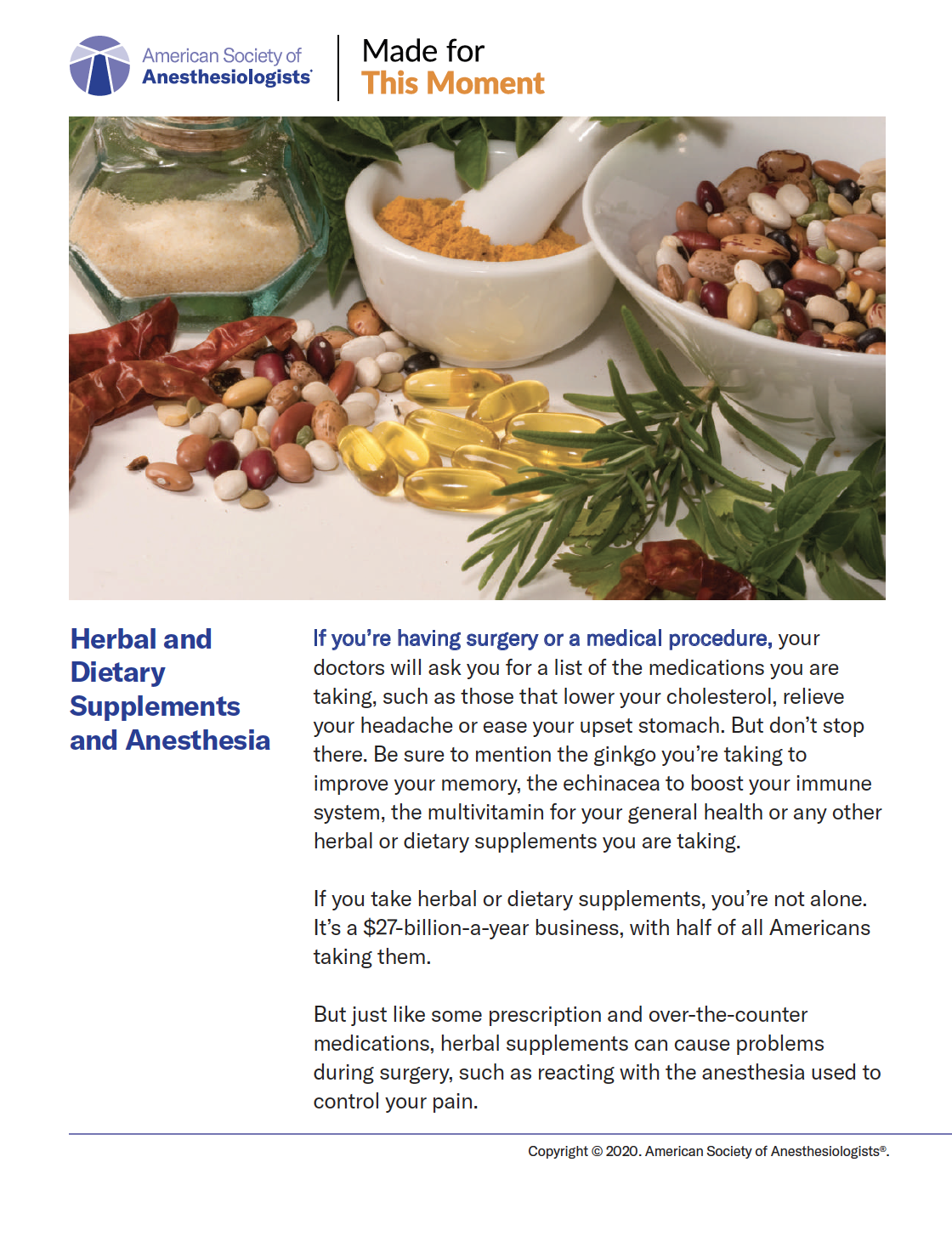Preparing for Surgery
If you’re planning to have surgery, you’ll want to spend some time preparing. That means taking care of your health, learning as much as you can about the procedure and getting to know the people who will be taking care of you. Planning ahead can help ensure you have a successful procedure and heal faster with a smooth recovery.
Planning ahead can help ensure you have a successful procedure and heal faster with a smooth recovery.
What should you do to prepare for surgery?
There are several steps you should take before your surgery so you’ll feel as relaxed and confident as possible. Start with answering these questions:
- Are your physicians qualified? Ask your physicians about their experience performing the specific procedure you are having to make sure they are qualified with the appropriate medical education and training.
- Is the facility licensed and accredited, and are emergency procedures in place? If you are having surgery outside of a hospital — at an outpatient facility or your doctor’s office — be sure it’s licensed (check with your state’s health department) and appropriately accredited by an organization such as The Joint Commission, the Accreditation Association for Ambulatory Health Care (AAAHC), or the American Association for Accreditation of Ambulatory Surgery Facilities (AAAASF). Also make sure the facility has medications, equipment, and procedures in place to handle emergencies, especially if there is no emergency facility nearby.
- Who will provide the anesthesia? Be sure your anesthesia care is led by an anesthesiologist. An anesthesiologist is a medical doctor who specializes in anesthesia, pain management, and critical care medicine, and works with your surgeon and other physicians to develop and administer your anesthesia care plan. With 12 to 14 years of education and 12,000 to 16,000 hours of clinical training, these highly trained medical experts play a key role in your care. They meet with you before surgery, closely monitor your anesthesia and vital functions during the procedure, and take care of you after to assure your recovery is smooth and your pain is controlled.
- Am I as healthy as I can be? Spend the time before the procedure being as active as you can, eating right and getting good sleep. If you smoke, stop as soon as possible — even if it’s just a day or two before surgery — because smoking can cause problems with breathing and recovery from anesthesia and surgery. Other steps you take will be guided by your meetings with the medical team, including the anesthesiologist.
- How do I avoid surprise medical bills? While your health and safety are likely your top priorities, it’s also important to make sure your insurance coverage is in order before surgery so you don’t receive any unexpected bills. Before having a medical procedure, ask who will be involved in your care and whether they are in your plan’s network. Call your insurance company to verify that the hospital or medical center and each physician and provider caring for you are in-network.

Preparing for Surgery: An Anesthesia Checklist
Download and print this checklist with the steps you can take to help ensure a successful surgery.

What do you talk about with the anesthesiologist?
Sometime before the day of your surgery, you should meet with your anesthesiologist so he or she can gather information that will help determine the right anesthesia care plan for you. Go to the meeting prepared to discuss your medical history, your health habits, and your past experiences with surgery and anesthesia. Be sure to discuss these things in detail:
- Your health habits and medications. Tell your anesthesiologist all about your health, such as how physically active you are, and if you have chronic health issues, such as asthma or other lung problems, diabetes, heart disease, liver or kidney disease, allergies, or any other medical conditions. Be sure to mention if you snore or have other sleep problems; these may be symptoms of obstructive sleep apnea, which can make surgery and anesthesia more dangerous. Provide a list of all prescription and over-the-counter medications, supplements, and vitamins you take. Your anesthesiologist might tell you to stop taking some of them.
- Your use of alcohol or recreational drugs. The use of recreational drugs such as alcohol, marijuana, narcotics, and stimulants should be discussed. These substances can affect how you react to anesthesia and the type and amount you’ll need.
- Your experience with anesthesia. Tell the anesthesiologist if you or a family member has had a bad reaction to anesthesia or pain medication, and make them aware of any anesthesia side effects you’ve experienced — even if they occurred years ago. Also mention if you’ve ever had a stroke or have experienced heat stroke.
- Your fears. It’s natural to fear surgery and anesthesia. If you’re afraid, tell your anesthesiologist. He or she can give you information to ease your mind and help you feel safe.
- Your questions. Bring written questions to your meeting. Write down the answers, because it’s difficult to remember everything you hear. Bring a friend or family member who can take notes and ask questions, as well as provide information you may not have thought of.
- Your recovery. The anesthesiologist continues to care for you after surgery, so ask about how any pain will be managed and any concerns you have about recovery, returning home, and getting back to your normal routine.

Herbal and Dietary Supplements and Anesthesia
Learn how some supplements can affect the anesthesia used to control your pain during surgery or create other surgery-related complication.
What should you expect right before surgery?
As the day of the procedure arrives, plan to:
- Follow pre-surgery directions and diet. Unless you’re having only local anesthesia, you may be told not to eat or drink anything after midnight before your procedure. This is because of the rare risk of food or liquid in your stomach getting into your lungs while you’re under sedation or general anesthesia. Ask your anesthesiologist for guidance; you may be told you can drink clear liquids and take your regular medications.
- Bring a friend. You won’t be allowed to drive after outpatient surgery, or even after a few days in the hospital if you’re taking pain medication. Plan to have someone take you home.
- Wear comfortable clothing. Wear or bring loose-fitting clothing. Your body might be sore or swollen from surgery, or you may have bulky bandages over your incisions. Leave jewelry and valuables at home.
